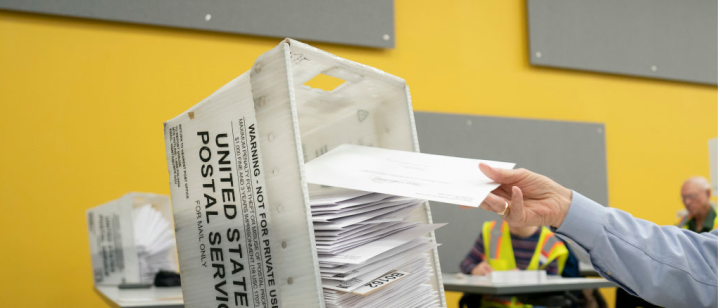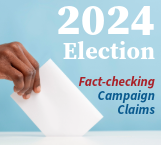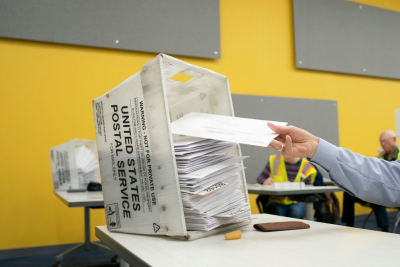
Este artículo estará disponible en español en El Tiempo Latino.
Former President Donald Trump claimed that Democrats are “getting ready to CHEAT” by encouraging overseas citizens to vote, falsely saying that ballots are being sent overseas “without any citizenship check or verification of identity, whatsoever,” and warning of “foreign interference.”

Trump then went on to say, “Remember, IF YOU VOTE ILLEGALLY, YOU’RE GOING TO JAIL.” In fact, it is perfectly legal for U.S. citizens living outside the U.S. to vote in federal elections, and there is no evidence that Democrats are trying to appeal to anyone other than legal voters. Also, while Democrats have been more active this year trying to encourage more citizens living abroad to vote, Republicans have made efforts to mobilize overseas voters as well.
Here’s the full message Trump posted to Truth Social on Sept. 23: “The Democrats are talking about how they’re working so hard to get millions of votes from Americans living overseas. Actually, they are getting ready to CHEAT! They are going to use UOCAVA [The Uniformed and Overseas Citizens Absentee Voting Act] to get ballots, a program that emails ballots overseas without any citizenship check or verification of identity, whatsoever. (Foreign interference?) Remember they say, we have the ‘most secure elections in history,’ and anyone can get a ballot emailed to them! They want to dilute the TRUE vote of our beautiful military and their families, who Comrade Kamala has totally disrespected and abandoned. Republicans must act to stop them from stealing our military votes. WATCH! Remember, IF YOU VOTE ILLEGALLY, YOU’RE GOING TO JAIL.”
With polls showing a very tight race between Trump and Vice President Kamala Harris, both parties are fighting for every vote, and Democrats see overseas citizens as a largely untapped constituency that is likely to lean Democratic.
Data from the Election Assistance Commission’s 2020 voting survey found that nearly 890,000 overseas ballots were counted in the 2020 election, a nearly 74% increase from 2016. That includes both uniformed service members and their families but also civilian overseas citizens. That second batch — which includes dual citizens, students spending a semester abroad, businesspeople on overseas assignments and those who have retired abroad — drove most of the growth, and is the constituency Democrats are focusing on.
Despite the large jump in overseas voting in 2020, those voters represent just a fraction of the eligible overseas voters scattered around the globe.
There is some uncertainty about the number of U.S. citizens living abroad. In its report, the EAC said an estimated 1.4 million uniformed service members and about 600,000 military spouses and voting age dependents were stationed abroad. It also reported an estimated 2.9 million voting age civilian citizens living abroad. With fewer than 890,000 total overseas votes counted in the 2020 presidential election, the voting participation rate among overseas residents was about a quarter of the participation rate among domestic voters, which was 66%.
Democrats have stepped up their efforts this year to find overseas citizens and to direct them to resources to vote. According to Politico, the Democratic National Committee and private donors have raised $450,000 to mobilize Americans from swing states living abroad. Politico said that effort “includes direct advertising on traditional media and social media, billboards across Canada, mailers and in-person gatherings.”
Former Speaker Nancy Pelosi and Sen. Corey Booker were two of the headliners for an online campaign event on Zoom promoting voting among overseas citizens in early September. Some 60 politicians, social media influencers and actors — such as Jane Fonda, Alfre Woodard, Kyra Sedgwick and Lynda Carter — also participated in the event, which was viewed by 33,000 people, according to Democrats Abroad.
So Trump is right that Democrats are “working so hard” to get votes “from Americans living overseas.” But Trump’s post could leave the false impression that overseas citizens can’t vote. The right for overseas citizens to vote — whether they are temporarily, permanently or indefinitely living abroad — is enshrined in federal law.
The Uniformed and Overseas Citizens Absentee Voting Act, enacted by Congress and signed by then-President Ronald Reagan in 1986, consolidated and upgraded existing laws to require states to allow American citizens living abroad to register and vote absentee in federal elections. Among its provisions was a federal postcard application that allowed service members and overseas citizens to register to vote and request an absentee ballot simultaneously.
In 2010, then-President Barack Obama signed a bill that included major revisions to the UOCAVA that required states to provide overseas voters with the option to request and receive voter registration and ballot applications via “electronic transmission.” It also created the option to electronically transmit absentee ballots to eligible overseas voters (though most states require that the ballots be mailed back). And the changes required states to provide ballots to overseas voters no later than 45 days before the election, in order to give adequate time for ballots to be mailed back by Election Day.

The methods of verifying an overseas voter’s identity and eligibility vary by state, but most require either a valid state driver’s license or the last four digits of a person’s Social Security number, according to the U.S. Vote Foundation, a nonpartisan group that provides online tools to assist U.S. citizens living abroad in registering to vote and requesting their absentee ballot using their state’s specific voter forms. Registrants must provide a valid signature under penalty of perjury. Most states also require overseas voters to sign their ballots, and the signature is matched against the signature from the voter’s registration. A handful of states further require witnesses to sign a voter’s ballot documents.
Susan Dzieduszycka-Suinat, president and CEO of the U.S. Vote Foundation and Overseas Vote, told us in a phone interview from Germany that the rules would make it “nearly impossible” to pull off widespread fraud through overseas voting. Votes are cast in thousands of voting jurisdictions, she said, and so you’d have to track down not only the identity of people living overseas, but also the jurisdiction of a state where they are eligible to vote.
“The ballots are highly scrutinized by election officials,” she said. “And any sudden increase [in a voting jurisdiction] would be a huge red flag.
“The program has been going on for decades, and the only time I’ve heard of fraud was in 2022 when an election official in Wisconsin fraudulently obtained a ballot to prove the system could be duped,” Dzieduszycka-Suinat said. (She is referring to the case of Kimberly Zapata, who was serving as deputy director at the Milwaukee Election Commission in 2022 and obtained three military absentee ballots using fake names and Social Security numbers, the Associated Press reported. Though Zapata said she was simply trying to expose flaws in the system, she was convicted of election fraud. She lost her job, was fined $3,000 and was ordered to perform 120 hours of community service.)
“It’s not an area where you’re going to find a long history of voter fraud,” Dzieduszycka-Suinat said. “There are all kinds of checks and balances.”
Responding to Trump’s post, a press release from Democrats Abroad — the official Democratic Party arm for Americans living outside the United States — said, “Ballots are only sent to people whose registration has been confirmed and validated by their local elections office. This latest baseless accusation of fraud is yet more desperate fear-mongering by a man whose political playbook is grounded in preemptively delegitimizing the votes of Americans he assumes are less likely to support him.”
Jay Sexton, a history professor and director of the University of Missouri’s Kinder Institute, said “there are many wrinkles and variations in how mail ballots work” because states run the processes for mail-in ballots that are sent overseas.
“Voters must affirm their identity (signing outside of the envelope, which is matched to voter registration card signature, for example),” Sexton told us in an email. “This is an example of a verification process for mail in ballots. I have not seen any evidence of widespread electoral fraud related to overseas ballots since I started following this topic in 2014.”
Could Overseas Votes Swing the Outcome of the Election?
As we said, nearly 890,000 overseas votes were counted in the 2020 election, a nearly 74% increase from 2016, according to the Election Assistance Commission.
Although most overseas ballots were historically cast by uniformed service members and their families, that changed in 2016, when a majority were cast by civilian overseas citizens. In 2020, overseas citizens made up 57.4% of overseas registered voters, compared with 42.3% who were uniformed service members.
Democrats point to Biden’s razor-thin margins of victory in 2020 in Arizona and Georgia –10,457 votes and 11,779 votes, respectively — as evidence that overseas absentee ballots make a difference. According to EAC, 18,435 overseas absentee ballots were counted in Arizona, and 18,475 in Georgia. (That includes both uniformed service members and their families as well as civilian overseas citizens.)
“Your votes from abroad truly have the power to change the outcome of the election,” Hillary Clinton said in a video made for Democrats Abroad, appealing to Americans living overseas to vote. “Just think, in 2020 votes from abroad helped to deliver Georgia and Arizona for President Biden and Vice President Harris.”
Overseas votes also played a prominent role in the outcome of the 2000 presidential election, the closest in U.S. history. After counting nearly 2,500 absentee overseas votes in Florida, Republican George W. Bush ended up beating Democrat Al Gore in the state by 537 votes, giving Bush the presidency.
A New York Times analysis of the overseas votes in Florida concluded that 680 of them were “questionable,” for reasons such as ballots lacking postmarks, ballots postmarked after the election, ballots lacking witness signatures and ballots mailed from towns and cities within the United States. The analysis did not identify that these votes were cast illegally, but the Times concluded they should have been disqualified according to Florida election law. Although the Times could not say whom those votes were for, the vast majority were in counties won by Bush. However, the story notes, “The Times study found no evidence of vote fraud by either party.”
Republicans Wooing Overseas Voters, Too
Trump commented on Democrats, but Republicans have also made efforts to mobilize overseas citizen voters.
“The RNC is working hand-in-glove with the Trump Campaign to reach all eligible voters — including those abroad — to turn out the GOP electorate for an unprecedented win on Nov. 5,” RNC spokesperson Anna Kelly told Politico.
The website for Republicans Overseas, which has no official affiliation with the GOP, provides information on overseas voter eligibility and voter registration.
Greg Swenson, chair of Republicans Overseas UK, told the Financial Times that his group actively promotes Trump’s campaign on social media and in press engagements, in addition to hosting a fundraising event for its 1,500 members. Swenson boasted that the fundraising event raised $2.5 million and was the largest fundraiser ever held outside the U.S.
“We’ve hired 20 paid employees in the UK, in addition to volunteers, just to chase ballots and help with voter registration,” Swenson said.
Nonetheless, Democrats have generally been more aggressive about courting overseas votes.
“Democrats have done more to organize themselves in overseas groups,” Sexton, from the University of Missouri, said. “This is the most recent phase of a better Dem organization overseas that dates back decades, including overseas voters having representation at the party convention.”
“Republicans have attempted to catch up in recent cycles,” he said, but it may be more difficult for Republicans to woo overseas voters who traditionally lean left.
Partisan Leaning of Overseas Voters
Conventional wisdom holds that overseas ballots cast by uniformed service members and their families skew Republican, while votes cast by overseas civilians favor Democrats. But there is no solid data on that.
According to AP VoteCast surveys, 59% of U.S. military veterans supported Trump in the 2020 election.
“Every vote is going to matter in this close election,” Sexton told us via email. “I don’t have firm polling data on this cycle, but it is reasonable to predict that Democrats carry more overseas ballots than do Republicans among non-military voters abroad. … Just remember that US expats are a very diverse group: study abroad students, transient businesspeople, artists/authors, dual citizens, return migrants, retirees in Panama, etc, etc.”
“From all the analysis that we’ve done and seen, something like 80 percent of Americans abroad vote Democrat,” Bruce Heyman, the former U.S. ambassador to Canada who is co-heading the Americans Abroad for Harris-Walz, a branch of Democrats Abroad, told Politico. “It’s because they care about foreign policy and the stature of America in the world and are very worried about a potential Trump return.“
DNC officials told Reuters there are more than 1.6 million Americans living overseas who are eligible to vote in the battleground states of Arizona, Georgia, Michigan, Nevada, North Carolina, Pennsylvania and Wisconsin.
But the actual number of eligible overseas voters and their partisan breakdown is largely unknown, Dzieduszycka-Suinat said. U.S. citizens are not required to register their location with the U.S. government. While the Federal Voting Assistance Program estimates there are just under 3 million American citizens of voting age living abroad, that’s a pre-pandemic calculation, she said, and many believe there are far more who have left the U.S. since the pandemic.
“I’m not upset that there has been an increased emphasis on overseas voting,” said Dzieduszycka-Suinat, a U.S. citizen who has been living abroad for 30 years. “We might live abroad, but we really do care. We know how foreign policy affects things. We see it every day.”
Editor’s note: FactCheck.org does not accept advertising. We rely on grants and individual donations from people like you. Please consider a donation. Credit card donations may be made through our “Donate” page. If you prefer to give by check, send to: FactCheck.org, Annenberg Public Policy Center, 202 S. 36th St., Philadelphia, PA 19104.